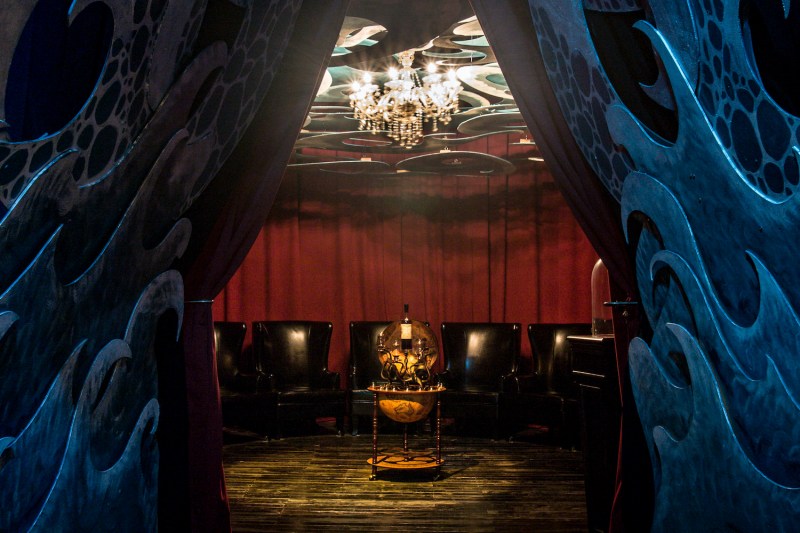
We live in a world where Billy McFarland scammed people out of millions of dollars with a fake festival in the Bahamas, but I can’t buy a ticket to Bryan Davis’s very practical idea for a Jurassic Park-inspired distillery tour in the United States Virgin Islands.
Though investors couldn’t get completely on board, you still can in the Arts District of Los Angeles. Literally. There’s an actual ship. Davis, 37, along with co-founder Joanne Haruta, 39, turned Lost Spirits Distillery into an L.A. destination thanks to a fully automated tour, complete with a pirate ship.
Davis and Haruta’s partnership started more than 10 years ago and has traversed the realms of liquor distillation and industry-disrupting technology. In their mid-20s, they set out to make absinthe in Spain under the now-shuttered Obsello brand. After winning a few awards and deciding they needed to step back from such a large operation, they returned to the U.S. to establish Lost Spirits Distillery in Monterey County, California.

In the early days, whiskey experimentation fueled Lost Spirits’ main offerings, including sourcing peat from many places beyond Scotland. From then to now, maturation takes unlikely residence in the late harvest Riesling barrels readily available in California. But the most notable quirk at this time was the discontinued, modern collector’s bottle Umami which fermented in ocean brine and was rated 94 points in Jim Murray’s Whisky Bible.
You can start to see that Davis is a big “what if?” kind of guy and luckily for all of us, these imaginative whims have been backed up with finesse and Haruta’s anchoring to reality.
In 2014, Lost Spirits gradually started shifting from whiskey to rum with Davis falling in love with the Tiki revival. Mid-year, whiskey production stopped completely on their artichoke farm/laboratory in Monterey and by October, they would revolutionize spirit aging.
“We finally got the chemistry dialed into where we could reproduce the signature of a 20-year bottle of rum in a laboratory,” said Davis, but they were never planning on releasing the groundbreaking dark rum. “How do you go from being this little cult distillery that hardcore boozers don’t really know about it to introducing this concept to people?”

You become a tech company, of course. From 2014 to 2017, Davis and Haruta licensed the technology behind the aging process — patented in 2015 — to hosts of savvy distillers. But their hearts still beat for the churning machinations of a distillery. So, naturally:
”Wouldn’t it be funny if we built a new distillery that operated on the same principles of [an] automated bathroom?” laughed Davis, but he was not actually joking.
In late 2016, they automated a bathroom that would greet you, play classical music, and scold you if you didn’t wash your hands. Despite how strange this sounds, the bathroom was a hit and the idea for the Arts District location began to form: a fully automated distillery featuring otherworldly tasting rooms.

Initially, you had to know someone to get a tour of Lost Spirits, but increasing consumer interest couldn’t be subdued by rising tour prices. Who doesn’t want to taste rum on a pirate ship, swirl an exclusive brandy, or check out stills with copper dragon heads?
Lost Spirits ended up flying so close to the sun with the immersive experience that it caught fire, an actual fire, and had to close their doors to the public. But in May, they’re back with a lush new experience, additional locations, and maybe even a submarine!
Davis, originally the Grand Poobah and now the more official CEO of Lost Spirits, has high hopes for the future. Though it’s definitely filled with more whiskey than rum, a plundering of new awards is surely ahead because the spirits behind this tasting room know exactly where they’re going.


